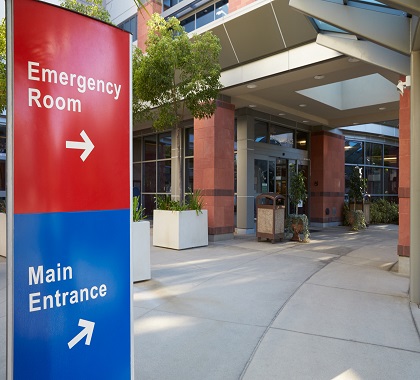Thirty-two states, including the District of Columbia, have chosen to expand their Medicaid programs under the Affordable Care Act (ACA). Medicaid is already placing severe financial strain on state budgets, and the program has a proven track record of failing to provide cost-effective and efficient care for those in need. Recent studies have found expansion fails on multiple levels, increasing costs for patients, providers and taxpayers while doing very little to improve health care outcomes.
Medicaid expansion may not even improve business for its staunchest supporters, the hospitals receiving the new patients and subsidies. A new report released by the Congressional Budget Office (CBO) in September analyzed profit margins for hospitals and made projections for the coming decade. The CBO analysis found Medicaid expansion will not make a notable difference in hospitals’ overall viability.
To arrive at its conclusion, CBO modeled the impact of various provisions of ACA in 2025 and compared those outcomes with hospitals’ profitability in 2011, prior to ACA’s passage. “The hospitals we examined would have to increase the growth of total revenues or reduce the growth of total costs by an additional 0.2 percent to 0.5 percent per year to achieve the same level of average profitability in 2025 as they obtained in 2011,” the CBO report concluded.
In a new report from the Department of Health and Human Services (HHS), an examination of Medicaid’s finances found the average cost of ACA’s Medicaid expansion enrollees was nearly 50 percent higher in fiscal year 2015 than the levels HHS had projected during the previous year. In 2015, Medicaid expansion enrollees cost an average of $6,366; HHS had predicted it would be $4,281. HHS also reported Medicaid spending reached $554.3 billion in fiscal year 2015, which is 5 percent higher than its projections. This is not surprising; the increased federal funding incentivized states to increase enrollment and boost payment rates.
Looking more closely at the HHS report, Brian Blase of the Mercatus Center at George Mason University wrote in Forbes costs for newly eligible adults were not decreasing as expansion supporters predicted. According to Blase, in the report, HHS found newly eligible adult Medicaid enrollees cost about 23 percent more than the previously eligible Medicaid enrollees.
Blase also says waste and abuse continue to plague Medicaid. He points to a September story in The Wall Street Journal highlighting a government report that revealed a dramatic increase in improper Medicaid spending between 2013 and 2016. “Improper payments amounted to about $67 billion in 2016, a $41 billion increase from the estimated $26 billion in 2013,” wrote Blase. “The large increase in improper Medicaid payments has occurred while the ACA Medicaid expansion took effect, suggesting that the expansion is the main cause of the stunning rise.” A more concerning problem is the fact that the Department of Health and Human Services has pulled the report from the Internet.
Medicaid expansion is extremely difficult to roll back, because federal law effectively blocks states from backing out of expansion under a provision called “Maintenance of Effort,” which requires states to fund a program at the initially agreed-upon level, regardless of the amount of federal funding received.
State legislators should continue to resist Medicaid expansion and instead reform their fiscally unsustainable program in ways that offer better care to enrollees and lower costs for taxpayers. Instead of expanding a flawed Medicaid model that is too costly, delivers subpar health care, and shifts more power to the national government, state lawmakers should focus instead on reforming the current system before choosing to expand it.
The following documents examine state Medicaid reform.
The Report Every State Legislator Should Read
http://www.nationalreview.com/article/440411/obamacare-medicaid-expansion-hospitals?target=author&tid=954473
In this article published by National Review, Chris Jacobs writes about a new report issued by the Congressional Budget Office that analyzes profit margins for hospitals over the coming decade. It concludes Medicaid expansion will not make a material difference in hospitals’ overall viability.
Evidence Is Mounting: The Affordable Care Act Has Worsened Medicaid’s Structural Problems
https://heartland.org/publications-resources/publications/evidence-is-mounting-the-affordable-care-act-has-worsened-medicaids-structural-problems
In this Mercatus Center paper, Brian Blase examines the effect of the Affordable Care Act on Medicaid. Blase’s findings reveal Medicaid expansion has worsened many of the structural problems in the program. “The unanticipated expense casts doubt on the value of the ACA Medicaid expansion. The enhanced federal match incentivizes states to boost ACA expansion enrollment and to categorize Medicaid enrollees as ACA expansion enrollees, and also encourages states to set high fees for services commonly used by expansion enrollees and high payment rates for insurers participating in states’ Medicaid managed care programs,” wrote Blase.
Projecting Hospitals’ Profit Margins Under Several Illustrative Scenarios
https://heartland.org/publications-resources/publications/projecting-hospitals-profit-margins-under-several-illustrative-scenarios
In this Congressional Budget Office paper, Tamara Hayford, Lyle Nelson, and Alexia Diorio calculate and project hospitals’ profit margins and the share of hospitals that might lose money in 2025 under several illustrative scenarios. “The hospitals we examined would have to increase the growth of total revenues or reduce the growth of total costs by an additional 0.2 percent to 0.5 percent per year to achieve the same level of average profitability in 2025 as they obtained in 2011; whether that would be easy or difficult is unclear,” the CBO report concluded.
Policy Tip Sheet: Medicaid Expansion
https://heartland.org/publications-resources/publications/policy-tip-sheet-medicaid-expansion?source=policybot
Kendall Antekeier of The Heartland Institute explains why states should avoid Medicaid expansion and instead reform this fiscally unsustainable program in ways that would offer better care at a lower cost to taxpayers.
The Growing Medicaid Expansion Bubble
https://heartland.org/news-opinion/news/the-growing-medicaid-expansion-bubble?source=policybot
In this edition of the Consumer Power Report, Executive Editor Justin Haskins examines Medicaid expansion and all the problems it has created for states, physicians and patients. “Despite the lack of attention the issue is getting, the growing Medicaid population could lead to state government meltdowns around the country and a national health care crisis for which most Americans are completely unprepared,” wrote Haskins.
Government Report Finds Obamacare Medicaid Enrollees Much More Expensive than Expected
http://www.forbes.com/sites/theapothecary/2016/07/20/government-report-finds-that-obamacare-medicaid-enrollees-much-more-expensive-than-expected/ – 75a85aba2dd0
Brian Blase of the Mercatus Center at George Mason University wrote in Forbes the costs for newly eligible adults were not decreasing as expansion supporters predicted they would. Blase says in a new report, HHS says newly eligible adult Medicaid enrollees cost about 23 percent more than the Medicaid enrollees who were eligible prior to expansion.
The Oregon Experiment—Effects of Medicaid on Clinical Outcomes
https://heartland.org/publications-resources/publications/the-oregon-experiment–effects-of-medicaid-on-clinical-outcomes?source=policybot
This article from The New England Journal of Medicine examines Medicaid outcomes in Oregon. Oregon gave researchers the opportunity to study the effects of being enrolled in Medicaid (compared to being uninsured) based on data from a randomized controlled trial, the “gold standard” of scientific research. The results showed no improvement in health for enrollees, but it did reveal better financial protections for patients and increased medical spending.
The Empty Promises of Arkansas’ Medicaid Private Option
https://heartland.org/publications-resources/publications/the-empty-promises–of-arkansas-medicaid–private-option?source=policybot
The Foundation for Government Accountability examines the empty promises of Arkansas’ Private Option program for Medicaid. It rebuts, point-by-point, direct quotes from supporters, including media interviews, floor speeches, and social media posts.
Why States Should Not Expand Medicaid
https://heartland.org/publications-resources/publications/why-states-should-not-expand-medicaid?source=policybot
Writing for the Galen Institute, Grace-Marie Turner and Avik Roy outline 12 reasons states should not expand Medicaid and should instead demand from Washington, DC greater control over spending to better fit coverage expansion to states’ needs, resources, and budgets.
Nothing in this Research & Commentary is intended to influence the passage of legislation, and it does not necessarily represent the views of The Heartland Institute. For further information on this and other topics, visit the Health Care News website, The Heartland Institute’s website, and PolicyBot, Heartland’s free online research database.
Whether sending an expert to your state to testify or brief your caucus, hosting an event in your state, or simply sending you further information on the topic, Heartland can assist you. If you have any questions or comments, contact Heartland Institute Director of Government Relations John Nothdurft at [email protected] or 312/377-4000.




